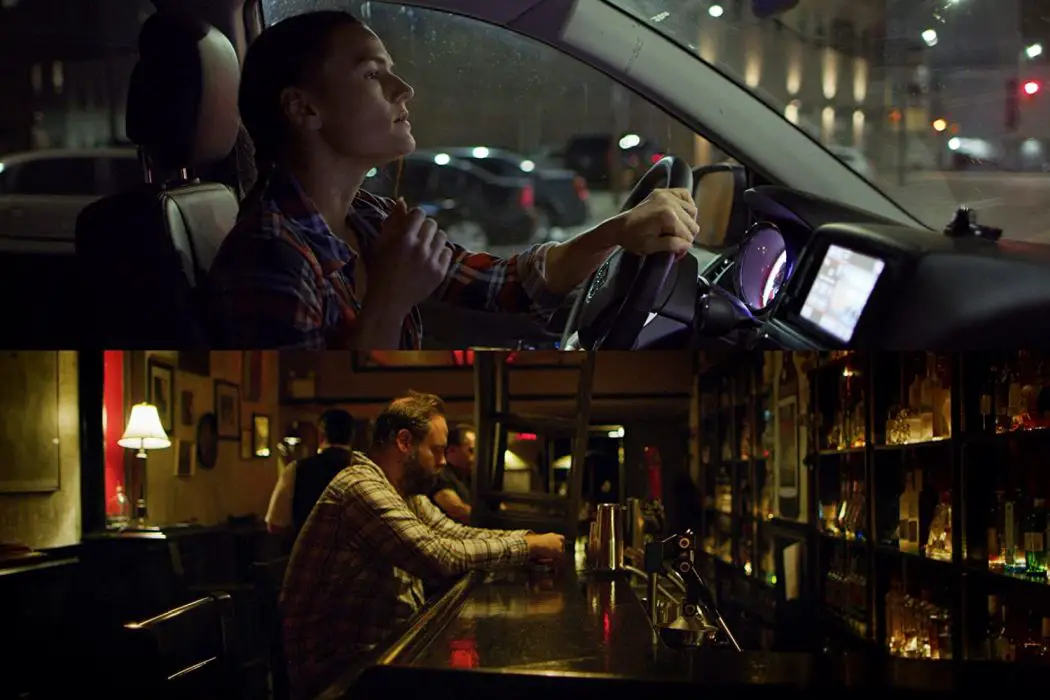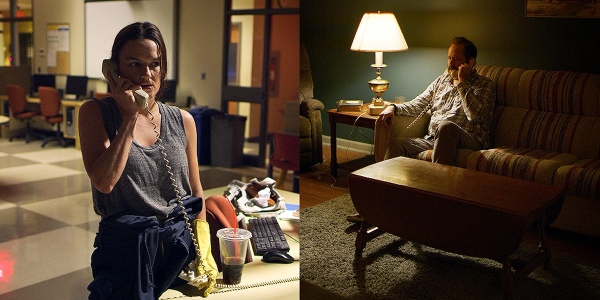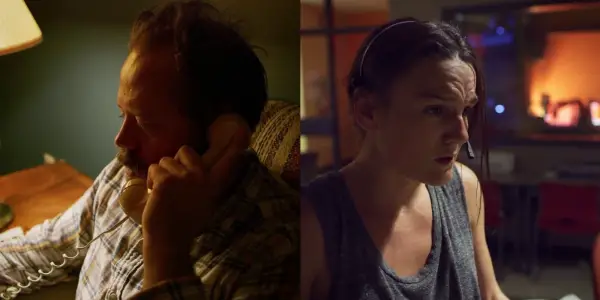LAST CALL: Answer The Call For This Suicide Drama

Andrew Stover is a film critic/writer from the Chicagoland. His…
Trigger warning: contains discussion of suicide
One could argue that a brief social interaction can make somebody’s day. It can improve their mood and promote healthy behavior, especially when they suffer from a great deal of depression. Because there isn’t anything better than having someone to talk to, and having someone to listen to you with an empathetic heart, free from any judgment.
As suicide continues to be a permanent solution for many, are we, as a society, doing anything to hinder this trend? To think that suicide can be universally cured is absurd and quixotic. Despite the warnings of what suicide can do the people they love, some believe it to be inevitable or necessary. In other cases, suicide stems from other underlying issues. Whatever it is, suicide is contemplated by those who perceive themselves as unworthy, and sometimes it takes an everyday person to remind them of their worth and the long-term ramifications of their self-inflicted demise.
Gavin Michael Booth’s Last Call is a stirring indie drama about a suicidal alcoholic who calls the wrong number when trying to reach a suicide prevention lifeline. A multi-tasking custodian answers the phone, only to find herself mollifying the man’s pain by making small talk. Can she guide him off the ledge, or is his mind made up?
Last Call Executes The Split-Screen/Single-Take Gimmick
A low budget doesn’t stop Gavin Michael Booth from embracing the one-shot technique, which creates a staggering effect that may very well amplify emotion. It’s also a proven technique that’ll garner adulation or attention, perhaps even showing the audience how much directorial finesse the filmmaker harnesses.
We first saw the single-take method in Alfred Hitchc*ck’s 1948 psychological crime thriller, Rope. Hitchc*ck’s Rope was an act of cinematic boldness that threw out the rulebook of how to shoot a film. Filmmakers later attempted this enterprising and strenuous approach, filmmakers like Béla Tarr (Macbeth, 1982), Mike Figgis (Timecode, 2000), Alejandro Iñárritu (Birdman, 2014), Tuva Novotny (Blind Spot, 2018), and Sam Mendes (1917, 2019). The innovation going on behind-the-scenes, however, can also have a counterpoising impact on the forces acting in front of the camera.
Last Call is a small-scale drama that treats one man’s life with considerable stakes, and a woman’s urge to save this man’s life as an act of unreserved empathy. The film follows Beth (Sarah Booth of The Moodys), the working mom/custodian, and Scott (co-writer David Wilkins, The Mindy Project), the dejected drunk. In order to capture them concomitantly, Gavin Michael Booth utilizes split-screen throughout the entirety of the runtime. At the same time, both of their realities are kept in check by a single take.
When we meet both characters, they are in a state of frustration. Beth is more visibly flustered, as she’s trying to phone anyone who may know where her son is. Beth is working the night shift as a custodian at a college, and she finds it increasingly difficult to focus on the job when her teenage son, who went to the movies earlier that night, hasn’t made it to the sitter’s yet. Protracted tracking shots of Beth racing from room to room is oddly absorbing to watch — courtesy of Sarah Booth’s emotionally captivating performance.

Scott, on the other hand, is drinking his sorrows away at a bar. That is until it’s closing time at the bar, and he must walk back to his apartment, intoxicated and internally hurt. Soon enough, Scott goes on to drunk dial several numbers, and no one answers on the other end. Except one number mistakenly reaches Beth, the perturbed custodian/mother who answers Scott’s call.
Speaking in a garbled monotone, Scott is clearly drunk and despondent. He’s also suffering from grief and self-blame. Anyone else may have ended the call after Scott said the first word, but Beth doesn’t hang up right then and there. Instead, she tries to decipher Scott’s reasons for calling the college. As they continue to casually converse, Scott eventually realizes he didn’t call the right number, and that he didn’t call a suicide prevention lifeline. He called Beth, a tenderhearted mother who understands that you can’t succumb to past mistakes, you can only look forward and strive to be a better person.
The premise anticipates a ticking-clock scenario. But I can’t say that the single-take ploy does any favors to build tension. If anything, the single-take approach replicates the agonizingly sluggish passing of time, and how even at the end, Scott is determined to at least talk everything out with someone. Gavin Michael Booth impressively collates the split-screen and single-take effect to bring us an ambitious indie drama about empathy and past hardship.
That being said, the script is rather elementary. A few too many lines come across as labored, or perhaps it’s how easy the lines were spoken. “Don’t let anyone tell you that you don’t have time to drink,” and “Therapy was the only hope I had for my daughter to talk to me,” effortlessly widens the discussion between them. Maybe you can blame the truth serum on the alcohol. The script also tends to develop Beth from a desultory listener to a motivated listener a bit unconvincingly. Yet, Sarah Booth makes us care about her character’s words, and her elaborate attempts to alleviate the man’s agony.
This Crisis Ends On A Gut-Wrenching Note
The set-up alone is naturalistically dire. The topic of suicide is always a delicate subject taken straight from real-life. We all know somebody who suffers from depression. We may know somebody who took their own life, or at one point attempted to do so. We may have suffered from depression ourselves. Last Call handles the topic with brave intent, exhibiting how anyone has the ability to listen with an open ear and open heart. Empathy is the strongest weapon in our arsenal.

Sarah Booth’s Beth is the standout of the film. Assuming an anxious demeanor and compassionately handling the conversation with Scott by maintaining a soft-spoken monotone, Sarah Booth vivifies her character’s maternal instincts and empathetic attributes. David Wilkins’ Scott is more reticent and timid. Wilkins plays the drunkard with a tactile sense of woe and defeat. Together, Booth and Wilkins sustain Gavin Michael Booth’s deeply heart-rending tale by giving it their all in the last 15 minutes.
Spanning 77 minutes and only ever focusing on two characters in reasonably enclosed environments, that already sets the stage for a theatrical performance. Despite having the structure of a play, especially during the halfway point, the ending is where Gavin Michael Booth basks in the melancholy and uncertainty of a situation that many face every day. The ending’s also where Sarah Booth pierces your soul and ends the movie on an incredibly high note.
Last Call: A Well-Acted & Nicely-Crafted Suicide Drama
Gavin Michael Booth faultlessly achieves the split-screen/single-take technique, while also exploring the matter of suicide with unadorned honesty. An undercooked script doesn’t make the two performances (Sarah Booth, more specifically) any less exceptional, and the conclusion any less powerful.
A suicidal man misdials while trying to reach a suicide prevention lifeline. He soon finds fugacious comfort in the company of a custodian, proving once and for all that anyone can help anybody by simply acknowledging them without judgment. I stayed on the line long enough to appreciate Gavin Michael Booth’s vision.
After reading the review, are you interested in seeing Last Call? Let us know in the comments!
The release date is unknown at this time.
For those who need it, you can reach the National Suicide Prevention Lifeline here: 1-800-273-8255.
Does content like this matter to you?
Become a Member and support film journalism. Unlock access to all of Film Inquiry`s great articles. Join a community of like-minded readers who are passionate about cinema - get access to our private members Network, give back to independent filmmakers, and more.
Andrew Stover is a film critic/writer from the Chicagoland. His film & TV reviews can be found on Film Inquiry & Film Threat.













